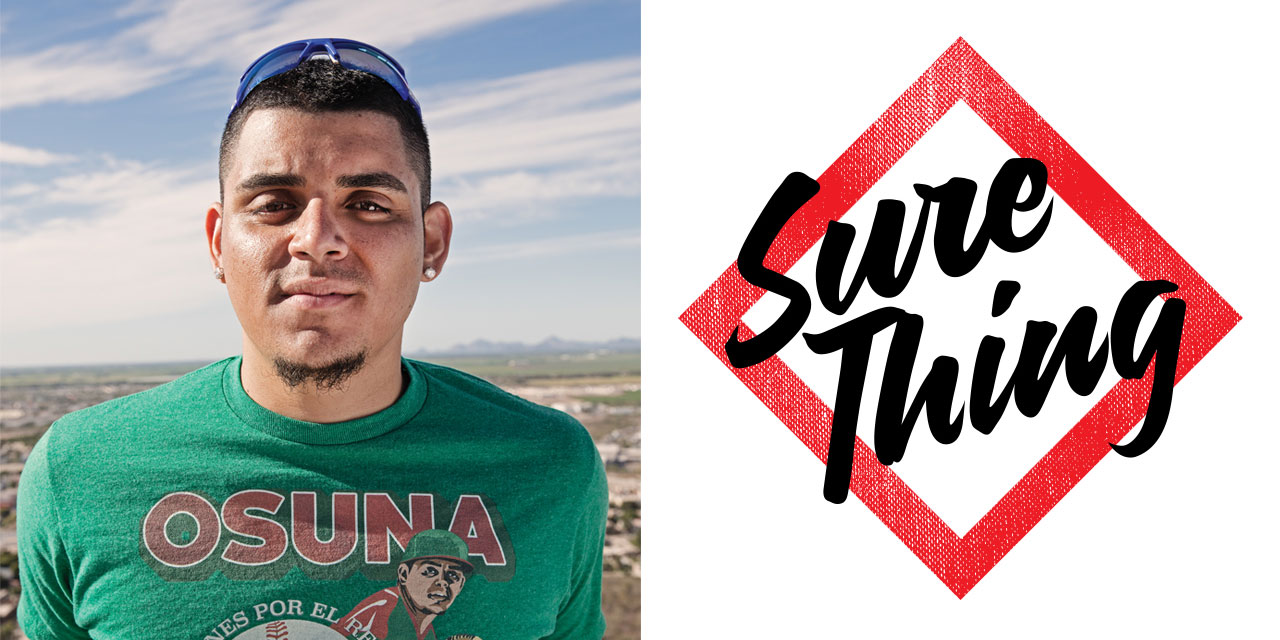
Despite growing up poor in a cartel-ridden part of Mexico, the Blue Jays’ Roberto Osuna has always been 100 percent confident he’d one day be a superstar
By Stephen Brunt in Los Mochis, Mexico
Photography by Russell Monk
No, we are not going there. The message is delivered in various forms from various people attempting to put the kibosh on an outing to the birthplace of Roberto Osuna, wunderkind closer of the Toronto Blue Jays, who is listed as hailing from the farming village of Juan Jose Rios in the Mexican state of Sinaloa, a speck just off the highway surrounded by the tomato, bean and corn fields that keep our produce sections stocked through the long northern winter.
Osuna entered the world there, in a tiny, rundown medical clinic on a dusty street. His mother, Guadalupe, went into labour during one of the weekly visits to his father’s family (there are a whole lot of Osunas in Juan Jose Rios, including the former major-league pitcher Antonio Osuna, Roberto’s uncle, from whom he is currently estranged). There wasn’t time to travel the 21 km back to the family’s home in the city of Los Mochis. “We were visiting my mother-in-law, and I started having contractions,” Guadalupe says through an interpreter. “We’re from Los Mochis, but I think Roberto wanted to be born [in Juan Jose Rios].”
We are not going to retrace their steps that day. The government tourism people who are our drivers, translators and escorts are clearly uncomfortable with the prospect, as are the Osuna family. The specific reasons for all of the unease are unstated, but, given where we are, self-evident. Drop the word “Sinaloa” into your favourite search engine and see what pops up.
- Chapters
- descriptions off, selected
- captions settings, opens captions settings dialog
- captions off, selected
This is a modal window.
Beginning of dialog window. Escape will cancel and close the window.
End of dialog window.
This is a modal window. This modal can be closed by pressing the Escape key or activating the close button.
It’s a big state in the northwest of Mexico, and some parts of it are much more dangerous than others. No one believes it would be wise to head down the road to Culiacan, for instance. But Los Mochis? It’s just fine. And on arrival, the city of about a quarter of a million seems familiar and benign—not at all like a front line in the war on drugs, instead almost Middle American with its Walmart and KFC and Starbucks and shopping mall.
“Los Mochis is like a small town,” Osuna explains as we drive into town from the airport. “Everyone knows each other. You’re going to feel safe. Nothing is going to happen there. If you don’t do anything bad, nothing is going to happen to you. People think about the cartel, Chapo Guzman. But that happens in Culiacan. Here, it’s a baseball city. There is no one expecting to rob another guy. Los Mochis is a little different than Culiacan and Mazatlan and the big cities.”
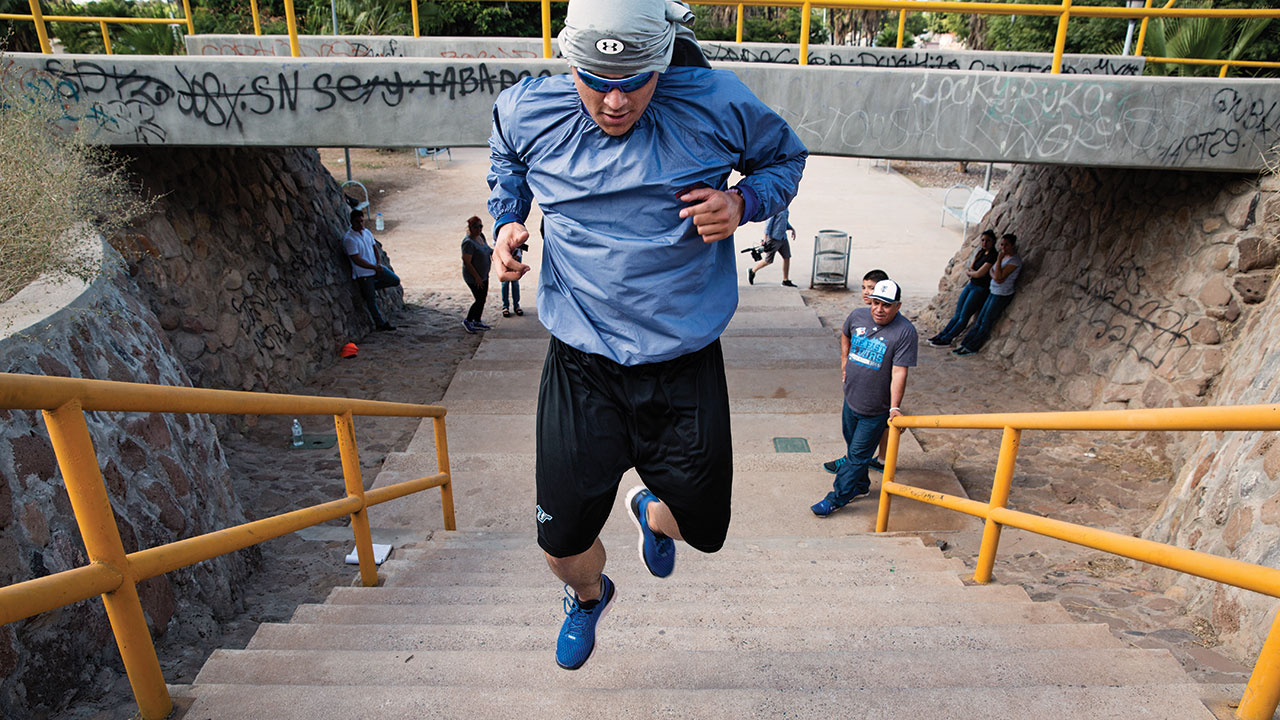
Ah yes, the diminutive Joaquin “El Chapo” Guzman, head of the Sinaloa Cartel, Mexico’s reigning drug kingpin and its most famous fugitive from justice. He was born not far from here, and the last time Mexican authorities arrested him, it was down the road in Culiacan. That was before his second jailbreak last July, when he slipped out of his cell into a tunnel and rode to freedom on a miniature motorcycle. (The first time, he simply paid off the guards.) The Mexican government is extraordinarily embarrassed that he’s on the lam, American authorities would like to deal with him on their own turf, and a huge reward hangs over his head.
Not that any of that should concern us in peaceful, friendly, baseball-loving Los Mochis. Still, in the interests of making the visiting gringos feel safe, we have our own detachment of local police, with lights flashing, horns honking and M-16s being brandished (not all of them loaded, it turns out), who are with us every minute of the working day, who accompany us to the gas station and the coffee shop and eliminate the need to stop at red lights if we don’t feel like it. What starts out as reassuring almost immediately begins to feel like overkill.
And then suddenly the trip to Juan Jose Rios is on, as though somebody talked to somebody and explained who was coming and how harmless they were and how it was about sports and a local baseball hero and not about that other stuff and so was given approval. Of course, that’s all conjecture.
First, though, there will be a drop-in at the Los Mochis police station. One of Osuna’s uncles is a high-ranking officer, and we have been summoned for a meeting with the chief, to help make the visitors feel safe and welcome. Hands are shaken. Photos are taken. A short speech is made. “Tranquilo,” the chief says, smiling broadly. “Tranquilo.” All is calm.
We then become part of a small, armed convoy on the road to Juan Jose Rios, passing by the same fields where Roberto and his father worked as vegetable pickers during some of the family’s most difficult times. “There are a couple of cartels out here, but we’ve got the police with us,” Osuna says from behind the wheel. “They will take care of us. My dad’s family lives there and everybody knows them. I think we are going to be OK.”
Once in town, the stops include the clinic where Osuna was born (we are invited to walk right into the obstetrics room, complete with examination table and stirrups), a farm store where Roberto Sr. demonstrates how he can still lug 100-lb. bags of fertilizer on his shoulders just like he did in the old days, and a makeshift butchery in a vacant lot, where, in celebration of something, a sheep has just been slaughtered. One of those who comes out to greet the visiting celebrity exchanges pleasantries while holding the bloody remains of the animal’s head in his right hand, its eyeballs still there in the sockets, its purple tongue lolling limply from its mouth.
We drop by Osuna’s grandmother’s house, inspect the family memorabilia, see the street where the kids played baseball and soccer, and after that we move on to a local diamond with a rocky infield where, on Sundays, Osuna played with what he refers to as his “family team”—a kind of little-league squad made up mostly of Osunas that competed against kids from neighbouring towns and was better than anyone in Los Mochis. (Local businesses advertise on the outfield fence, including another branch of the extended family: Super Carnes Osuna. Maybe it’s the guy with the sheep.)
This is where a scout from the Diablos Rojos, the most storied team in the Mexican League, first came to watch a 14-year-old Osuna play. “I remember that day. He came in the second inning. He said, ‘Show me how hard you can throw.’ I threw 89–90. ‘We have to wait two more years, but I am going to sign you,’ he said.”
Soon they came from the big leagues, as well, from the Dodgers and the Braves and the Yankees. “They talked to me,” he remembers. “They said, ‘Osuna, what are you doing playing here?’ But this is my life. It doesn’t matter where I play. I just want to play baseball.”
The tour over, it’s time to head back to Los Mochis. As we pull out of Juan Jose Rios, the Federales are waiting for us at the highway on-ramp—two men, anonymous in black balaclavas and mirrored sunglasses, standing in the back of a modified pickup truck, automatic rifles in hand, with another cop sitting in the driver’s seat, ready to hit the gas, the kind of set-up that would be extremely practical if you had to respond with deadly force in a great big hurry. They have been ordered there for our protection, and they stay in position until we pass. “I haven’t come here since I was 14, because it gets really hard with the cartel and all those things,” Osuna says. “I never came again until today, so it was kind of special for me.”
“Will you come back?” he is asked.
“No. I only went because you guys wanted to go. I’ve got big dreams. I can’t do that.”
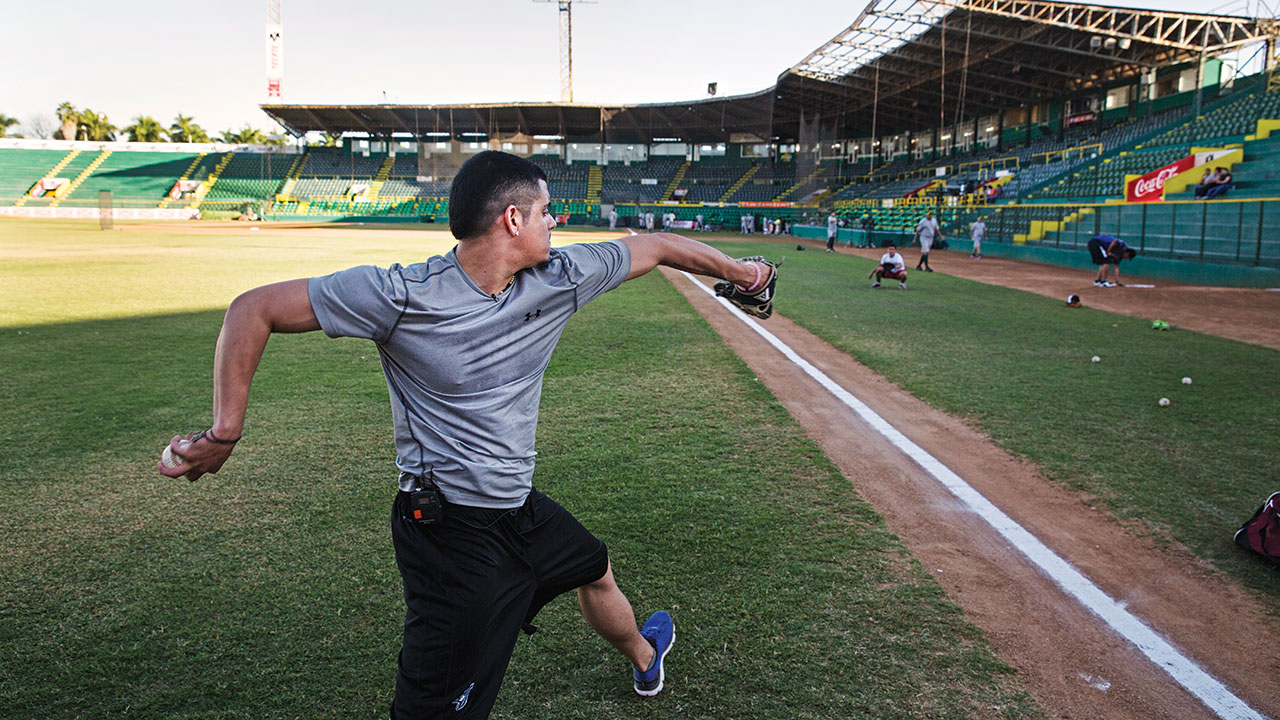
Roberto Osuna Sr. pitched for 22 seasons in the Mexican professional leagues, both the summer loop, which is roughly equivalent to triple-A, and the winter Pacific League, which is based here in the northwest part of the country. The latter includes the Los Mochis franchise, the Caneros, who wear green and gold like the Oakland Athletics and employ a parrot-costumed mascot whose signature move is finding attractive women in the crowd, convincing them to dance and then dropping his pants.
Osuna’s dad moved from team to team and town to town, playing as far north as the American border and as far south as Yucatan. Roberto and his mother moved with him. (The family has an extensive collection of miniature uniforms and team jackets presented to the first-born son, it seems, at every stop.) “Hermosillo, Saltillo, Monterrey, Yucatan, Nuevo Laredo, Navojoa, Obregon,” Osuna says. “I was in a lot of places. I was always with my dad. He took me to the field since I was a year and a half old. His last year he played for my city, Los Mochis. It was kind of special. They made a ceremony for him. He was a big guy here in Mexico. But it was hard, especially for my mom. It was a lot of moves. He was here one day and then he got traded to another team and we had to find another place. I had to make new friends.”
“He was a restless little boy,” his father says. “Always with a ball in his hands, always practising his pitching. He’d always say, ‘Dad! Dad! I want to pitch just like you!’ It was the only thing he wanted to do.”
When Roberto Sr. retired from baseball, the family’s life changed dramatically. “Here in Mexico, the men have to work,” Osuna says. “It’s the men who have to take care of everything—the house and family. My dad has five brothers and four sisters. [When he was playing baseball], he had to pay for everything plus us. So if he made, like, 10 thousand a month, it was nothing because there were 16 or 17 people to support. After he retired, we started going down. We lost everything. So we had to start from the bottom again.”
Osuna’s sister, Ramona, is three years younger, and his brothers, twins Pedro and Alex, are eight years younger. They were just babies when their father stopped playing. “Toward the end, I had an operation on my arm and I couldn’t pitch anymore,” Roberto Sr. says. “It was a bad situation because we were living in a small room and we’d just had twins, which meant double the milk, double everything. I got a job as a coach for kids. But when it rained, I couldn’t coach, and if I didn’t coach, I didn’t get money. We couldn’t eat, so I had to find other ways to work.”
There really wasn’t any choice. Roberto Sr. went to work picking vegetables in the fields around Juan Jose Rios. His eldest son, age 12, left school and joined him. “It was a tough moment,” Osuna says. “The bus picked us up at 4:30 or 5:00 in the morning and took us to Juan Jose Rios. We were so poor. We ate some eggs in the morning and beans. That’s all we ate the whole day. And we ate some tomatoes from the fields. We had to save some money and bring it back home. It was tough, but I learned from it.”
The reality of that life is hammered home when we make a stop in Los Mochis at the house where Osuna grew up. It is unoccupied now, a place the family uses for storage, and where some of the humble accoutrements of their previous existence remain exactly as they were on the day they moved to the modest but comfortable middle-class home a few blocks away that Osuna bought with his signing bonus in 2011. The iron-gated garage area out front and an extra bedroom were added when Osuna first made a bit of money from baseball. But in the days when he joined his father to work in the fields, there were only two rooms—a kitchen and a single bedroom in which all six members of the family slept. “We had two beds that we put together. It was my sister close to the wall, then my twin brothers—they were only one or two years old. And then my mom. If there was room for my dad or myself we slept on the bed. Otherwise we slept on the floor. We did that a lot of the time.”
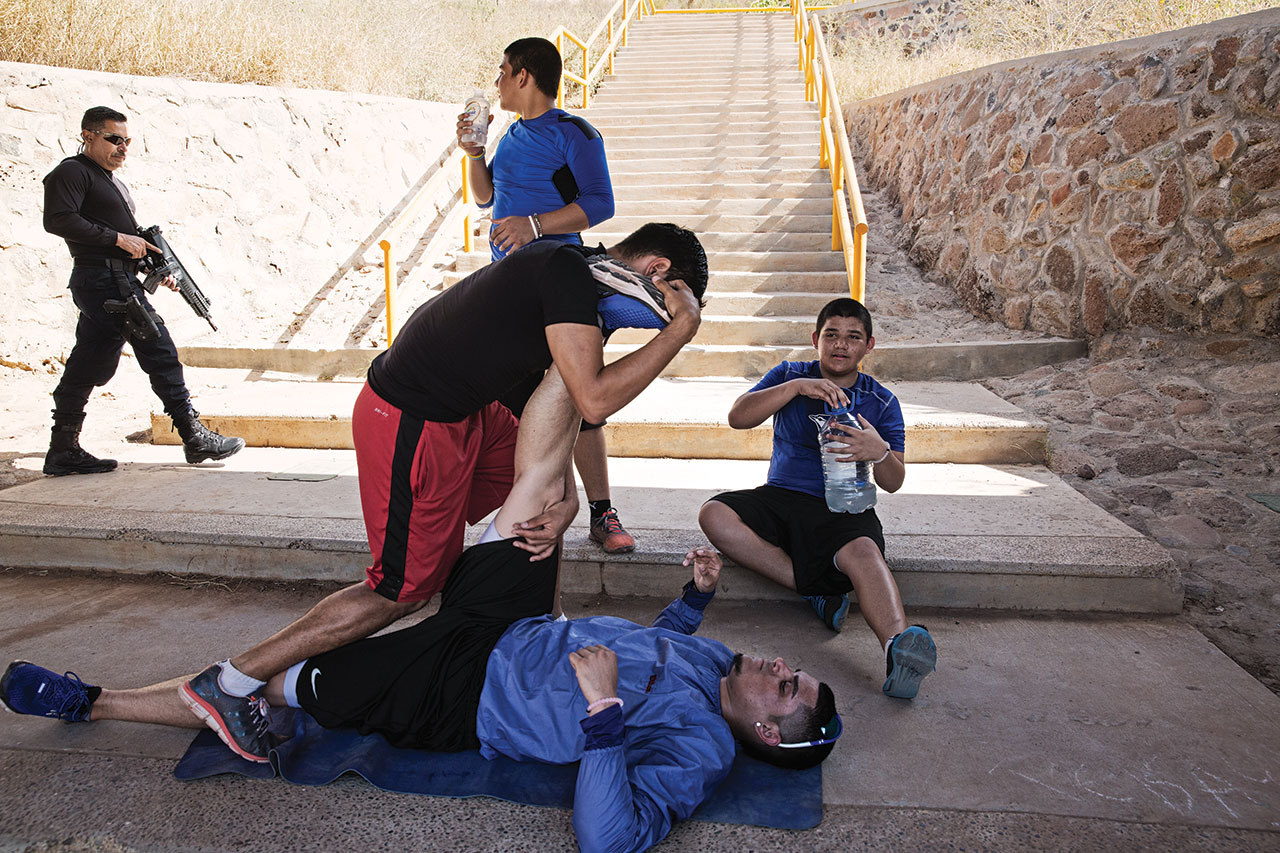
Osuna’s mother and siblings are moved to tears when they speak about that period of their lives, and about the sacrifices made. “He left school for us and worked hard to reach his goal of being in the majors,” his brother Alex says. “Now we’re at a good school and have a good house, and I thank God that he did it.” (The twins are 13, one a pitcher the other a catcher, and both aspire to careers as professional baseball players.)
But the decision to drop out wasn’t purely about making ends meet. Osuna freely admits that part of the reason he quit was because he simply didn’t like going to class. And he had already decided by then that his single goal in life was to play professional baseball. “I told my parents—I was honest—I told them I don’t really like the school. I told them I want to play baseball. And they said, ‘So let’s do it 100 percent.’”
The yard in back of the old house is now overgrown with eye-high weeds and thistles, but Osuna can still point out the window he broke playing ball there and the dents in an old rusting piece of metal that served as his backstop when he pitched—there’s enough space to accommodate the full 60 feet six inches from rubber to home plate—under his father’s tutelage.
Grooming him to play ball became the family enterprise, and Roberto Sr. became his full-time coach. “[Roberto Jr.] started talking about moving us up,” his mother says. “He promised me that when he signed, he’d buy me a house, buy me a car. He always said that when he made the big leagues, it’d all be for us, to give us a better life. He didn’t have a childhood like others, he didn’t have any toys, didn’t get anything from Santa and the Three Kings. That’s why he doesn’t want his sister and brothers to lack a thing.”
Not everyone understood the Osunas’ decision. Friends and neighbours, even members of the extended family, were skeptical. “People here in Mexico are so negative,” Osuna says. “They always think you’ve got to go to school and do this, this and this to be big. But what I think is that sometimes you’ve got to take some risks and see what happens. I was 12 years old. Here in Mexico, if you don’t sign at 16 or 17 years old, you’re not going to play anywhere. There were a lot of questions, obviously. Everybody was asking me—who will guarantee that you will play in the big leagues someday? Everybody was saying you have to go to school—that is the best thing you can do right now. But my dad and mom always taught me that if you want one thing, you’ve got to work hard to do it, and that’s what I did.”
Not long after dropping out of school, Osuna was presented with a unique opportunity. “I was playing in the league here and a guy saw me and told me that he thought I was a good player, and kind of pushed me a bit. He sent me to play in Mexico City—I think we won the tournament. And then they invited me to go to Japan.”
Osuna had been selected to play with a touring regional all-star team that would compete in a tournament in Tokyo. “I was so nervous. That was my first time out of Mexico. My family stayed here. And I didn’t have any money with me.”
“He said he would go, but promised not to cry because he said the kids that cry just return home,” his mother remembers. “He said, ‘I want to be a professional. And professionals don’t cry. I’m already 12 years old!’ And I kept crying and crying. He was so brave, always so brave.”
“Before I knew it, I was in Japan,” Osuna says. “There were a lot of emotions. I was happy. I was sad. I wanted to cry.”
On the field, he excelled, pitching and playing shortstop. When it was finished, he and another of the kids from Mexico were invited to stay behind and play with a Japanese team against 18-, 19- and 20-year olds. Most importantly, he would be paid—under the table. “They gave me some money, and I sent it back home with the team. I said, ‘Give this money to my family and tell them I’ll come home soon.’”
He stayed in Japan for two months. “We played in that league, we won, and then they sent us back home. It was so funny. We didn’t speak any Japanese and there was nobody who spoke Spanish. I was always tall for my age, and my friend was, too, so they didn’t know how old we were. At 12 years old, I was throwing 78–80 mph, which was good for that league. But when I was playing shortstop, sometimes a line drive would go by me—swoosh. Man, that part was hard.”
Two years later, there was another all-star team, and another trip, this time to Italy. “I pitched two games. I pitched a no-hitter in the first game and we won the second game, too. A lot of scouts talked to me there. And I got lost in Rome. I didn’t know where to go. I had two friends with me and they said, ‘Osuna, where do we go?’ I said, ‘I don’t know, just walk behind me.’ We were lost for two and a half hours. We finally found the police and told them, ‘We are from Mexico. We are looking for our team.’ I guess that’s just the way I am. If you tell me, ‘Osuna stay here and don’t move,’ I would move. I would walk away and see what is here. I’m the guy who takes some risks.”
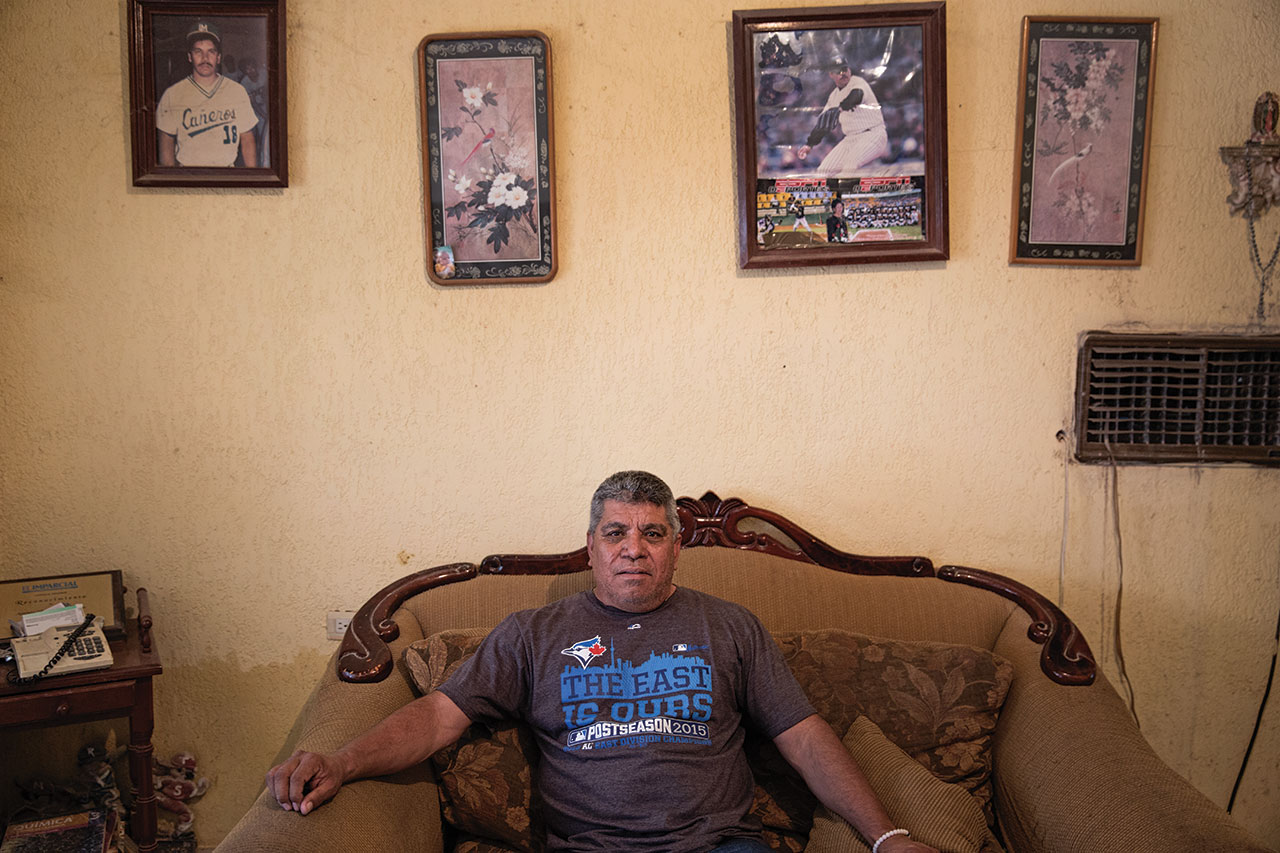
He was approaching his 16th birthday, the age at which he’d be eligible to sign a professional contract. The scouts who turned out regularly to watch him were impressed with his arm, his velocity, his pitching repertoire and his baseball maturity. What scared some of them away was his physique. Osuna was what, in a gentler time, they used to call “husky.” At 16, he was about six feet tall and weighed 250 lb. “Here in Mexico, they don’t care about how you look,” he says. “They care if you can get some outs, or if you can throw hard. They care about winning. When I went to Florida [to play minor-league ball], I saw everybody in shape with good bodies, strong guys. I thought then, ‘I don’t want to be like this. I want to look good and feel strong, too.’ That was when I started working hard. I did a lot of diets, but then I came to Mexico and ate everything. It took me a year and a half to get a good body.”
Rather than signing directly with a major-league organization, Mexican players must first sign a contract with a Mexican League team, which then controls their big-league rights and can sell them almost in the manner of a soccer transfer. “Lots of teams made offers,” Osuna says. “It’s easy to make an offer, but it’s different to have the money to pay for it. We didn’t make a deal. My dad said, ‘No, no, no, we deserve more than that.’”
Then Diablos Rojos of Mexico City stepped up. “They’re the best team in Mexico,” says Osuna. “They’re a big organization. They’ve got some academies. They helped my family. That’s why I signed.”
The idea was to bring Osuna along slowly before exposing him to the veteran professionals of the Mexican League, so he was sent to the Diablos’ academy for further seasoning. But Osuna had other ideas. He noted that there was a player at the academy who was getting a lot of attention—a position player, much older than him, who had already earned a reputation as a great hitter. “Everybody is talking about this guy,” Osuna says. “So I told the owner I want to face him.” He did, and struck him out.
There wouldn’t be an apprenticeship after all. The owner called Osuna into his office and told him that he was now a Diablo Rojo, that he was headed for the big team. He made his professional debut at an away game in Saltillo, where his father had broken the Mexican League record for pitching appearances in a season. “For me it was wonderful because he had accomplished his dreams to be a professional ballplayer here in Mexico,” his mother says. “And the stadium where he made his debut was where he played as a one-year-old, where, when he was two, he said he wanted to be a pitcher. So it was like two dreams coming true: becoming a professional and starting his career in Saltillo. Amazing.”
“I was so nervous,” Osuna remembers. “I couldn’t see anything beyond the catcher. It was just the catcher and me. But I believe in myself. I trust in myself 100 percent. I’ve got a lot of confidence in myself. Always.”
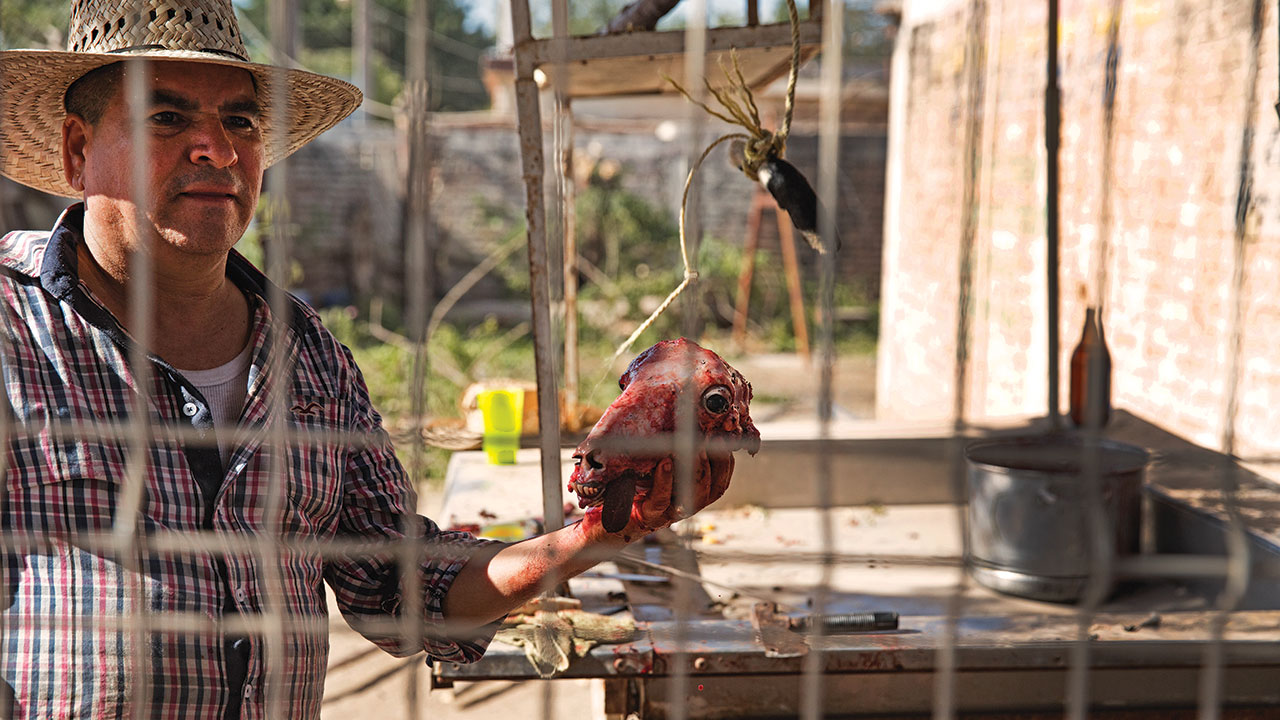
A few more days in Los Mochis, a few more police escorts, and what begins to sink in is the unspoken reality here, the delicate balance.
In December 2009, a Mexican marine was killed during a raid in which one of El Chapo’s kingpin predecessors also died. The marine was hailed as a national hero. He was given a state funeral. His mother told reporters how proud she was that her son had died battling the cartel. After she returned from the cemetery, gunmen came to her house and shot her dead, along with the marine’s aunt, his sister and his brother. Now, when soldiers or police die in the drug wars, their names are not revealed.
So don’t ask, don’t tell. Don’t rock the boat. Live, let live, go about your business. You’re a baseball family, not a cartel family. El Chapo comes into a restaurant in Los Mochis. A little shiver goes through the place. Then one of his people announces that there’s nothing to fear, that he’s just there for a nice meal and that he will be picking up the tab for everyone. That’s life. “It’s not easy to grow up here,” Osuna says. “You don’t have good people around you sometimes. But I knew the way from home to the field and the field to home. I didn’t have to worry about what else was happening here in Sinaloa.”
For a change of scenery, we head for the beach at Maviri, about a 45-minute drive from Los Mochis on the shores of the Gulf of California, near Topolobampo, where the ferry arrives from Baja. It’s a place for locals, not a resort for winter-evading northerners. On Friday and Saturday nights, they pull their cars onto the beach and turn up the banda music. A long spit of sand edges the turquoise waters and is dotted with a series of small, thatch-roofed, open-air restaurants serving beer and seafood. Our personal cops relax, put down their guns and share the meal. The kids head for the beach to play stickball on the sand. Osuna slams that little rubber sphere a mile. The sunset behind them is cinematic, like it’s been photoshopped—too vivid, too intense to be real.
Tranquilo. Muy tranquilo.
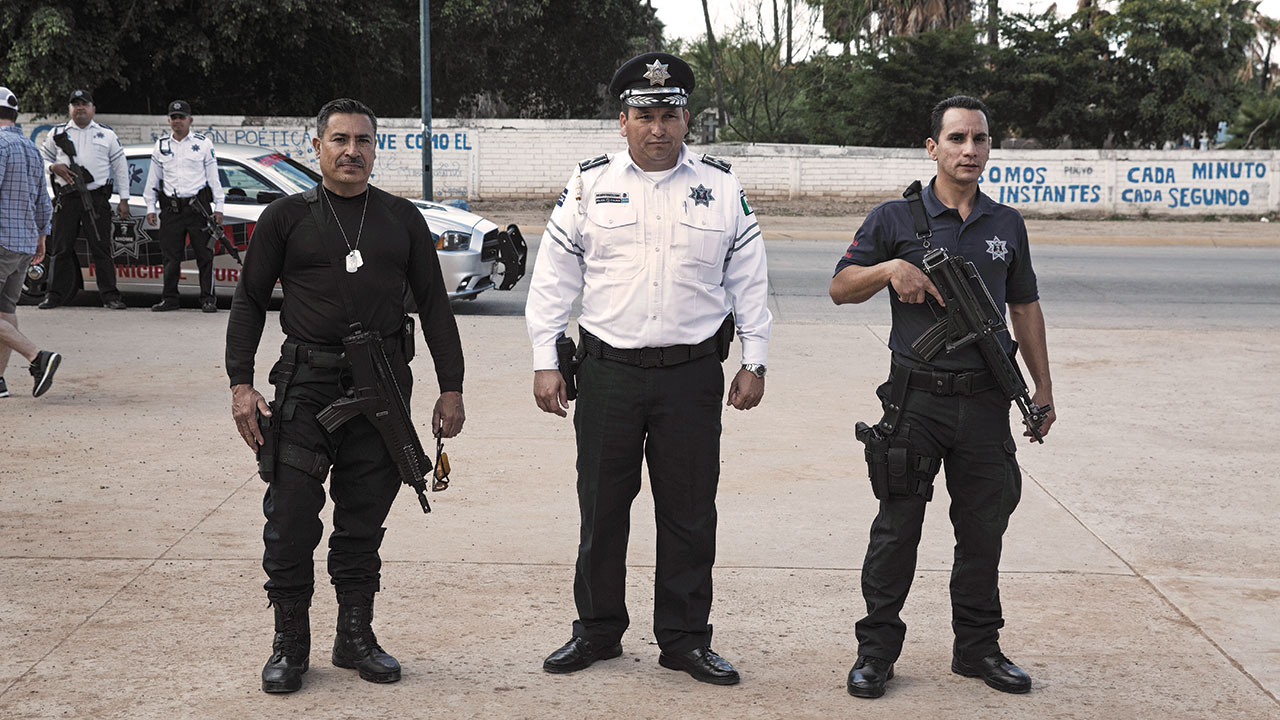
Osuna pitched in 13 games in the Mexican League before he was shut down in June 2011 to preserve his signing value. The Blue Jays came out on top in the bidding war for his services, paying a $1.5-million bonus. He was entitled to just a quarter of that, still a life-changing sum, and immediately bought his family the house in which they now live. (It’s considerably larger than the old two-room place, but still the six Osunas seem to prefer living in very close quarters, and invariably travel as a group. If he ever leaves this place, for another part of Mexico, or maybe Arizona, Osuna says his entire family will be coming with him.) In 2012, Osuna began his minor-league career in rookie ball at Bluefield, Va., and before the season was done, was promoted to low-A Vancouver. His numbers weren’t startling, though he recorded more than a strikeout an inning. Then again, he was still only 17 years old.
When it came to Blue Jays pitching prospects, most of the talk focused on the Lansing Three—Aaron Sanchez, Noah Syndergaard and Justin Nicolino—who played together for the Jays’ single-A affiliate, the Lugnuts. Already, though, there were some (including the venerable scout Mel Didier) saying Osuna had the best arm in the organization. But given his age, given he was still growing, still dropping that baby fat, the Jays planned to move him along slowly and carefully.
Osuna had his own plan and his own timeline. “My goal was to make my major-league debut at 18,” he says. “I was 100 percent sure I was going to make it. One hundred percent sure.”
Osuna began the 2013 season in Lansing. In his 10th appearance, his elbow betrayed him. “I threw a two-seamer. I felt it. But I mean, I’m Mexican and I’m an Osuna. I didn’t care. I stretched my arm right away. I threw the next pitch, and that’s when I felt the pop. That was a tough moment. I cried a lot. I called my family. I came back here to Mexico and everybody was saying, ‘I told you this was going to happen.’ They were so negative to me. But I didn’t care. My family said to me, ‘If you don’t play baseball, if you don’t make the big leagues, we’re always going to be here for you.’”
Tommy John ligament replacement surgery is regarded as almost a rite of passage now—a near inevitability for certain pitchers with certain mechanics, something they might as well put behind them earlier rather than later. The results (at least the first time around) are almost always positive. Following a year-long rehab, pitchers tend to return stronger than they were before the operation.
Osuna, though, couldn’t be reassured. “They told me I needed a Tommy John, but I didn’t want to. I was so scared to do it. I thought that was the end of my career. I always said if I need Tommy John or any surgery I’m going to stop playing baseball. And it came when I was only 18 years old. I thought if I have surgery, I’m never going to be the same.”
“He was very worried and very sad,” his mother says. “He cried for several days. We went to mass to pray to God and the Virgin of Guadalupe. He said, ‘I did something bad! I did something bad to deserve this!’ Afterwards, he went through rehabilitation, following it exactly. He said, ‘I’m resolved to keep going forward. My career is not over. I have a reason to fight. I have your support, and that’s my fortress, and I’ll work hard day and night, day and night, mentally and physically.’ And he achieved it and is stronger than ever.”
It took time, though. In the summer of 2014, Osuna made a tentative return, with one appearance in rookie ball, and then seven more, mostly rocky, with the Jays’ high-A affiliate in Dunedin, Fla. At the end of the season, he was sent to play for the Mesa Solar Sox of the Arizona Fall League, where major-league teams hone the skills of their best prospects and get them a few extra innings in a more controlled environment than Caribbean winter ball. He was still sore from the surgery. His velocity was back, but he struggled with command. Speaking with him there, he seemed shy, uncomfortable, tentative, his English halting.
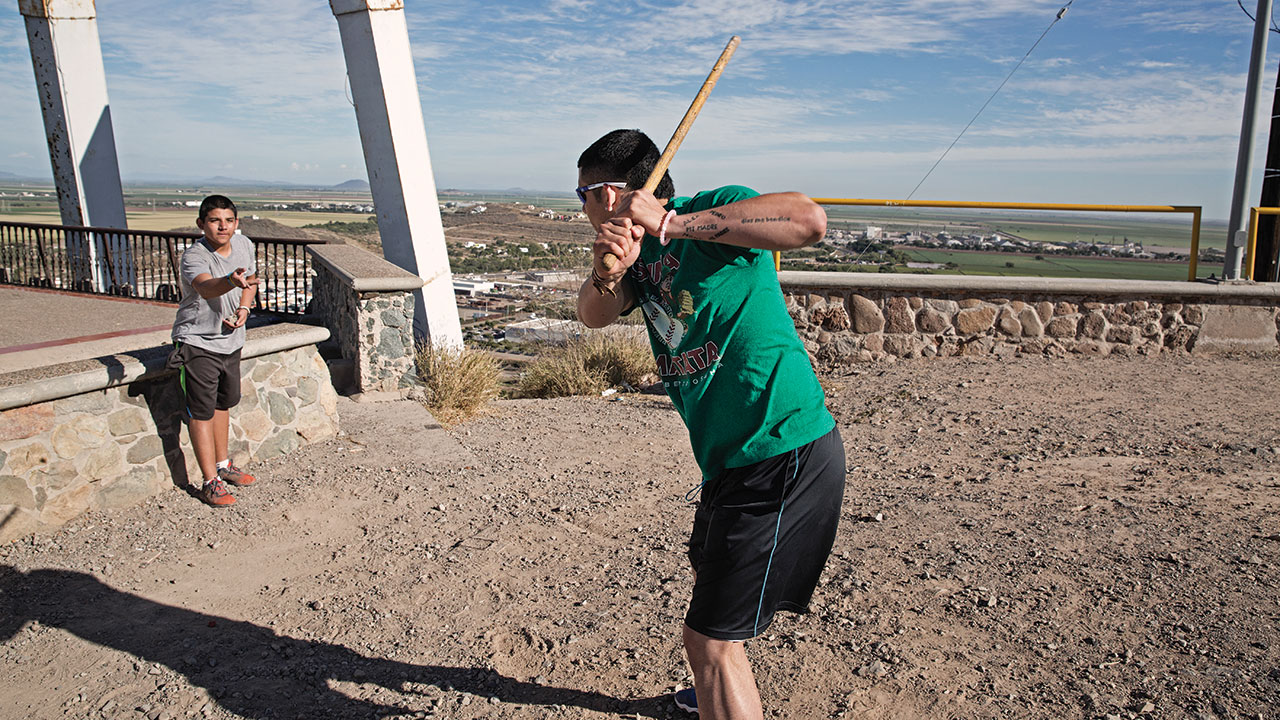
The following spring, Osuna was invited to train with the big-league club along with another very young pitcher, the Dominican Miguel Castro. No one in the Blue Jays’ organization thought the two prospects had a chance to make the team, but that wasn’t the point. The idea was to give the kids a taste of a major-league clubhouse for a couple of weeks, to let them experience the environment, absorb the wisdom of established players and understand just how high the bar is set before sending them off to an age- and skill-appropriate minor-league destination.
Osuna says that he was intimidated from the moment he arrived. “I couldn’t believe it. I was in the clubhouse. I saw Bautista, Reyes, Encarnacion, Donaldson, all those guys. I was so nervous. I didn’t want to do anything to make them feel mad at me. I didn’t move from my locker the first two days. I didn’t even want to walk to the kitchen and have someone say to me, ‘You can’t do that.’ I was so scared.”
But meeting him there in the first week and renewing acquaintances, it sure didn’t seem that way. Osuna stood tall, as though he’d grown six inches during the winter. His English was now impeccable. Sitting down for a radio interview, he was asked about his goals in baseball. “I want to be a superstar,” he said matter-of-factly.
Meanwhile, because of the Jays’ limited bullpen options, and because of how well Osuna (and Castro) pitched during the spring, the token big-league drop-in turned into something else entirely. “The second day, they told me, ‘Hey Osuna, you’re going to be here for a couple of weeks before you go back to the minor leagues. We’re going to give you one inning [in a Grapefruit League game] before you go back to the minors.’ I said, ‘Yeah, yeah, I’ll take it.’ So they sent me to Sarasota against the Orioles and I threw my inning. Pete [Walker, Jays pitching coach] talked to me after and said, ‘We’re going to give you one more chance.’”
That chance led to another, and to another. Reassignment to the Jays’ minor-league complex kept being postponed. “I was in Port Charlotte. It was two weeks before the last cut. Pete came over and talked to me. ‘Hey Osuna, how is your elbow feeling?’ ‘Good.’ ‘I talked to Gibby [John Gibbons, Jays manager], and he said you have a little bit of a chance to make the team. I don’t want you to go crazy. Just keep working.’”
Late in the spring, Osuna gave up two runs during an outing against the Atlanta Braves and figured that was it. But all he heard from the manager afterwards was: “Great job.”
Castro, with his 100-mph fastball, also stuck around. A convenient media narrative emerged during spring training that Osuna and Castro, both very young Latinos, were best buddies and boon companions. It turns out that they’re very different people from very different backgrounds, and were in fact not particularly close. The two guys who Osuna says helped him most? Steve Delabar and Aaron Loup. “The last day, they called Castro to the manager’s office and told him he made the team, but they didn’t call me,” Osuna remembers. “And also I saw the suitcases with the names and I didn’t see mine. I thought, I guess I’m going to the minors. Then they called me to the office. [Blue Jays assistant GM] Tony LaCava, Gibby and all the coaches were there. ‘We think you are still so young,’ Gibby said. ‘But congrats, you made the team.’ My heart started going so fast. It was unbelievable.”
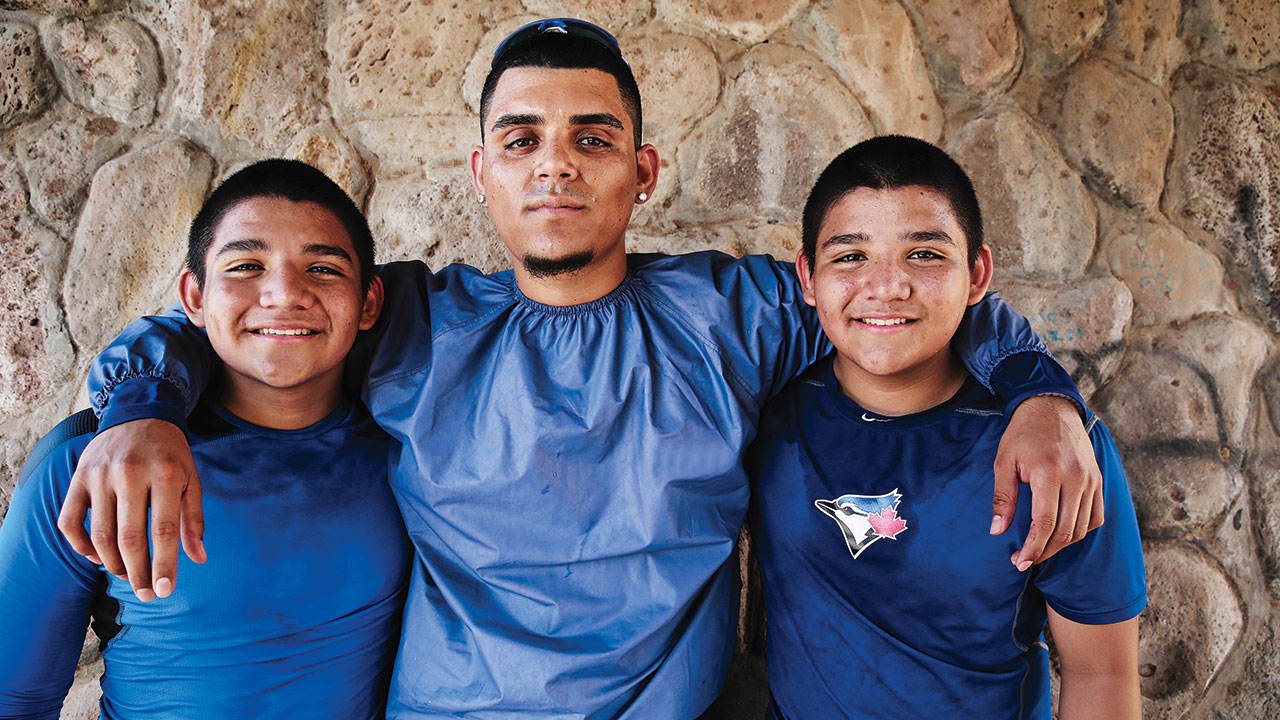
For the youngest player in the major leagues, it was quite a scene for a debut. April 8, game two, Yankee Stadium. R.A. Dickey had turned over a lead to the bullpen, but Loup had a disastrous set-up appearance and then Brett Cecil, the closer, had blown the save. Early days, but already time for Plan B. “Hey Osuna, get ready,” bullpen coach Dane Johnson hollered at him. “You’ve got the next hitter.” He had no idea who that was. The bullpen door swung open and he ran to the mound. Gibbons was waiting for him there and handed him the ball. “Good luck,” was all he said.
Osuna still hadn’t looked toward the plate. “I warm up,” he says. “I pray. I take my step up to the mound. And there’s Alex Rodriguez. Fastball first pitch, and I feel really strong. This guy can’t hit my fastball. Not right now.” He struck Rodriguez out.
Anyone (and that would be just about everyone) who followed the Blue Jays’ magical 2015 season knows what came next. Cecil continued to struggle in the closer’s role. Castro was given a shot, failed, and was eventually sent down. Cecil was brought back, and failed again; Delabar was given a chance to close and wasn’t up to the task. With the team spinning its wheels, with pressure mounting and precious few options at his disposal, Gibbons decided in desperation to hand the ball to Osuna.
Osuna never gave it back.
Perhaps you recall the division series against Texas, game five, the most weird and wonderful moment in Blue Jays history. What you may have forgotten, post seventh inning, post bat flip, was Osuna’s key role in that glorious victory. “I was OK before Bautista’s home run. But when he hit it, my heart started going so fast. I heard the fans and everybody going so crazy. And then I got the call right away. Dane said, ‘Osuna, get ready, because you’ve got the second batter.’ ‘What?’ ‘You’ve got the second hitter.’ I picked up my glove and I put my first warm-up throw into the stands. ‘Osuna are you OK?’ ‘Dude I’m nervous.’ But when they opened the door, it was so different. It was the game of a lifetime. Guys on first and second, one out, facing Josh Hamilton. What if that guy hits a home run? I was going to be the bad guy.”
He struck out Hamilton and four of the five hitters he faced, wrapping up the series-clinching win. After the final out, Osuna gazed skyward and performed the sign of the cross, as he always does, the least surprised person in the building that he was where he was.
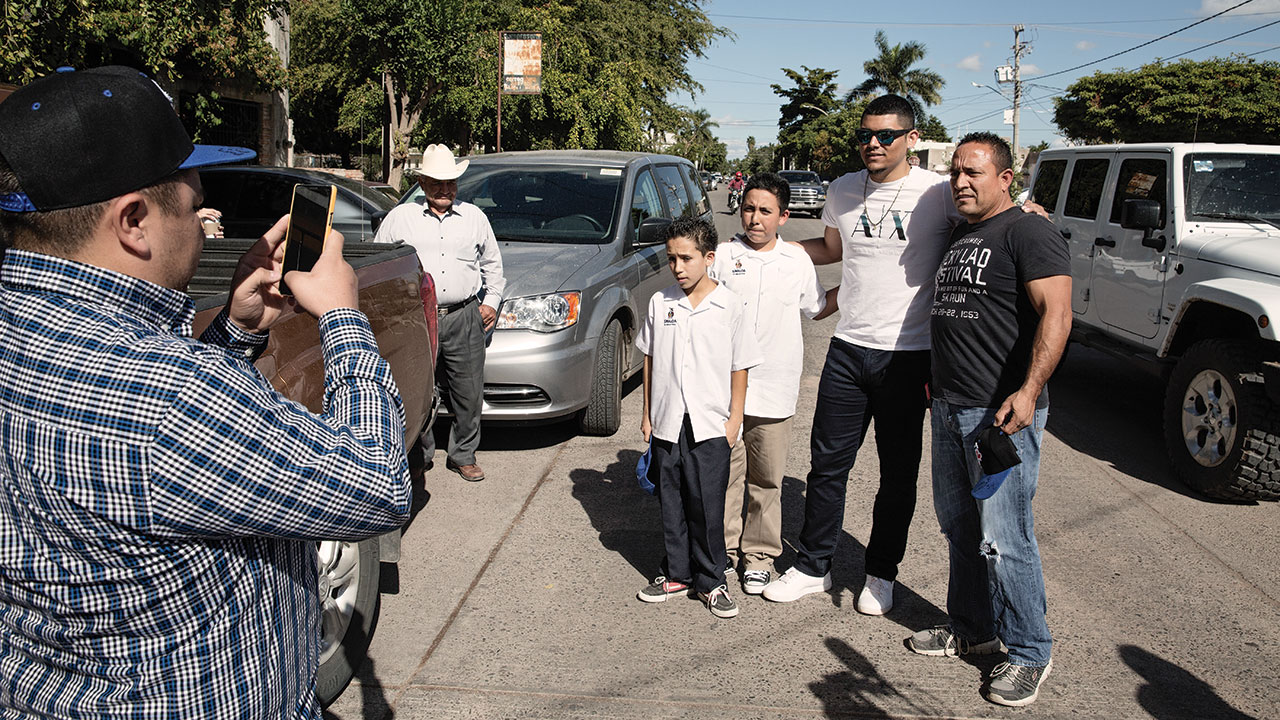
Our final morning in Los Mochis dawns, and it’s perfect, like an ideal June day back home. A brief shower has cleared the air and summoned up a coolish breeze. We are sitting in the Plazuela de 27 Septiembre, a verdant oasis in the centre of town with a fountain and a bandstand and wrought-iron benches. Things feel different, though—subtly at first, then less so as the helicopters start circling low overhead with their doors open, soldiers with automatic rifles hanging out as far as they dare and scanning the ground below. “Someone was murdered last night,” we’re told, but it’s nothing to worry about, nothing out of the ordinary. Our interpreter/guide/translator calls her sister in Los Angeles, who has a greater facility in English, and asks her to pass on reassuring words to the visitors. “Tranquilo,” she tells us.
Then, over the course of an hour, the truth begins to emerge in hushed conversations. Our chaperones become tenser, our police escorts more animated. Was it El Chapo? No, no. It was somebody else.
Eventually, we know most of the story that in a few hours will make international headlines: Early this morning, just a few blocks from here, in this town where nothing bad happens, marines captured El Chapo. The Mexican president soon confirms the news in a tweet. It takes time before some of the crazy details emerge, the meetings about a biopic project that tipped the authorities off, the interview with Sean Penn, and all the rest. But what we know, almost immediately, is that there has been a gunfight, that several of El Chapo’s men have been killed, that he escaped down a sewer, emerged to flee in a waiting car and was apprehended and taken to one of the many no-tell motels on the edge of town where they kept him until arrangements were made to get him back to jail.
When a small private jet buzzed over our heads a little while later, our cops tell us that, yes, that’s him, that’s El Chapo, on his way to Mexico City, and perhaps this time they won’t let him escape.
We pose for some final pictures with our protectors. The police—after making sure they’ve removed the bullets—let us pose holding their guns.
As we grin for the camera, one of them, who speaks a bit of English, whispers to me, “Just don’t tell anyone I’m the guy who caught El Chapo.”
He’s joking, and he’s not.
This story originally appeared in Sportsnet magazine.




Almost Done!
Please confirm the information below before signing up.
{* #socialRegistrationForm_radio_2 *} {* socialRegistration_firstName *} {* socialRegistration_lastName *} {* socialRegistration_emailAddress *} {* socialRegistration_displayName *} By checking this box, I agree to the terms of service and privacy policy of Rogers Media.